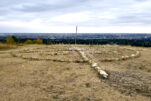The Human Condition: The East
By Daniel Schnee on December 22, 2021.
One common question I get when lecturing or speaking at student gatherings is what it is like to live in Japan, or spend time in Asia doing research at various temples. This inevitably leads to some version of the following question, “Is the East better than the West?” in terms of lifestyle and spiritual values from Buddhism, etc. So much Asian culture is fascinating to us Westerners that it would seem “the East” would have all the answers we see lacking here at home. First and foremost it must be understood that whatever one seeks throughout Asia, the various lifestyles and spiritualities will not solve what they are not designed to solve; whatever within us that is unsolvable already. As commonsensical as it is, people forget that Asian cultures cannot be what they aren’t, and they indeed are not what a lot of people imagine them to be. While living in Japan, for example, I met a significant number of newcomers seeking to “find themselves” while they worked as an English instructor. They were huge fans of Japanese animation, food, and so on, and had dreamed of remaking their life into some sort of “Japanese” fantasy. They professed to love Japan deeply, only to discover that its people refused to be a part of their fantasy, instead being ordinary people capable of as much goodness and badness as anyone else. As soon as the fantasy was interrupted these people who supposedly loved Japan almost instantaneously hated it, and left a couple of weeks later. Their imagined Japan became real Japan, which did not bend to their desires. The same happens at Buddhist temples. Almost invariably when I stayed at any number of them in Japan, China, or Korea to meditate and do research I would meet a new arrival from some Western country who had sold all their possessions in order to join the monastic community and permanently become a monk, i.e. become enlightened. They were excited about the ideas and promises of Buddhism, so they too had come to Japan to find themselves, within a spiritual fantasy of transcendence. After a day of adjusting to the schedule, the head monk usually assigned them to me as their guide; helping them begin their monastic life. This meant chores: lots and lots of chores. Novice monks learn a great many lessons through hours of raking and scrubbing, which is not what these newly arrived future Buddhas give everything up for. They want the cool robes, beads, chanting, and exciting new ideas… not raking and cleaning toilets. The opportunity to serve their brothers and sisters in humility is lost on them and within hours they leave, never to be seen again. Buddhism, pop culture, martial arts… none of them are gratifying, after even a single day in China, Japan or South Korea, if they are being used to fill a hole in one’s soul that existed before arriving. The East is what it is, and offers us great treasure, like we the West offer it. Regardless of geography, what is truly great is sowing what you wish to reap, and the East is filled with wonderful countries in which to give what is best in you… not take what is best in them. Dr. Daniel Schnee is an anthropologist who studies Japanese creative culture. 8-7




